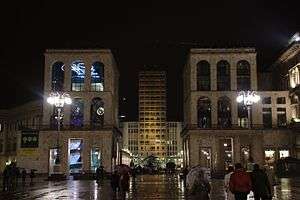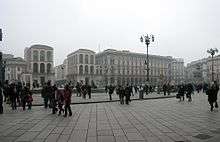Palazzo dell'Arengario
| Palazzo dell'Arengario | |
|---|---|
 | |
| General information | |
| Architectural style | Fascist |
| Location | Piazza del Duomo |
| Town or city | Milan |
| Country | Italy |
| Coordinates | 45°27′49″N 9°11′24″E / 45.4635°N 9.1900°ECoordinates: 45°27′49″N 9°11′24″E / 45.4635°N 9.1900°E |
| Current tenants | Museo del Novecento |
| Construction started | 1936 |
| Completed | 1956 |
| Renovated | 2000s |
| Technical details | |
| Material | Façade: Candoglio marble |
| Design and construction | |
| Architect |
|
| Other designers | Façade: Arturo Martini |
| Renovating team | |
| Architect |
|

The Palazzo dell'Arengario is a Fascist-era complex of two symmetrical buildings in Piazza del Duomo, the central piazza of Milan, Italy. It was completed in the 1950s and currently houses the Museo del Novecento, a museum dedicated to 20th-century art.[1] The word "arengario" refers to its original function as a local government seat in the Fascist period.
History
The Arengario was designed by Piero Portaluppi, Giovanni Muzio, Pier Giulio Magistretti e Enrico Agostino Griffini. Construction began in 1936, but experienced several delays and suffered from the World War II bombings; it was eventually completed in 1956.[2] The façade is decorated with reliefs by Arturo Martini.
In the 2000s, the palace was restored and adapted by Italo Rota and Fabio Fornasari to house the Museo del Novecento, a museum of twentieth-century art inaugurated in 2010, especially renowned for its unique collection of Futurist paintings. During the restoration works, a "media façade" (i.e., a 487 m2 LED screen displaying news on upcoming events, advertising, and more) was affixed to the façade of the left-hand building.[3]
References
| Wikimedia Commons has media related to Palazzo dell'Arengario. |